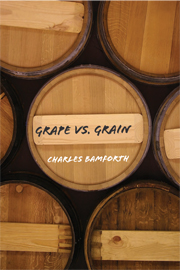Book contents
- Frontmatter
- Contents
- Preface
- Grape vs. Grain
- 1 Beer and Wine: Some Social Commentary
- 2 A Brief History of Wine
- 3 A Brief History of Beer
- 4 How Wine Is Made
- 5 How Beer Is Made
- 6 The Quality of Wine
- 7 The Quality of Beer
- 8 Types of Wine
- 9 Types of Beer
- 10 The Healthfulness of Wine and Beer
- 11 Conclusions about Beer and Wine – and the Future
- Further Reading
- Index
1 - Beer and Wine: Some Social Commentary
Published online by Cambridge University Press: 16 September 2009
- Frontmatter
- Contents
- Preface
- Grape vs. Grain
- 1 Beer and Wine: Some Social Commentary
- 2 A Brief History of Wine
- 3 A Brief History of Beer
- 4 How Wine Is Made
- 5 How Beer Is Made
- 6 The Quality of Wine
- 7 The Quality of Beer
- 8 Types of Wine
- 9 Types of Beer
- 10 The Healthfulness of Wine and Beer
- 11 Conclusions about Beer and Wine – and the Future
- Further Reading
- Index
Summary
I must come clean by admitting to have worked in or around the brewing industry for nearly thirty years. It will come as no surprise to you, then, that I drink beer. I like beer. I admire brewers. I think they are some of the most skilled, devoted, and ingenious people on the planet. Charming, too.
However, I do not dislike wine, nor the viticulturalists and enologists who bring that amazing product to the market. I drink wine, though I prefer beer. I believe that the brewer has much to learn from the winemaker with regard to re-establishing their product as an integral component of a wholesome and elongated lifestyle. Equally, the winemaker must doff his or her cap to the brewer insofar as technical matters go. There is no question that brewing leads the way in matters technological and scientific. Indeed, throughout the industrial ages, brewing has been a pioneering process that has informed all other fermentation industries, even to the production of pharmaceuticals and the latter-day biotechnologicals, with their diversity of high-value products.
In this book, I compare beer and wine. I do not seek to decry wine. Rather, I aim to demonstrate why brewers can hold their heads high in the knowledge that their liquid is every ounce the equal of wine, by any yardstick you choose to nominate.
- Type
- Chapter
- Information
- Grape vs. GrainA Historical, Technological, and Social Comparison of Wine and Beer, pp. 1 - 12Publisher: Cambridge University PressPrint publication year: 2008



